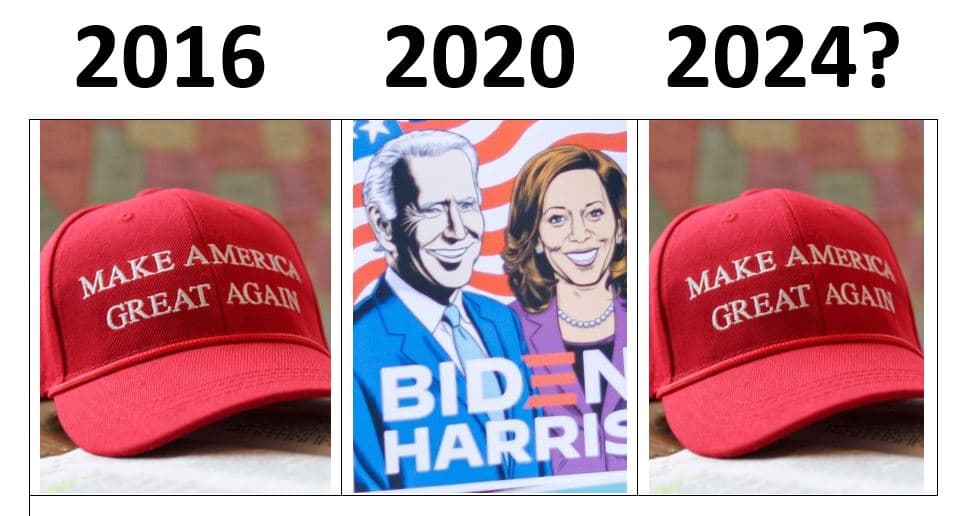
26 Apr 45 = 47?
Donald Trump was introduced recently as “The 45th President of the United States.” Stepping to the microphone, he said, “And 47th.” There is no indication he was kidding. [November 15, 2022, note: Clearly, he was serious.]
This provoked us to ponder which presidents have sought to return after leaving the White House, the results, and what might happen if Mr. Trump were to run again in 2024. That caused us further to consider, in retrospect, how good of a president he was the first time. Which, in turn, triggered Principle Based Politics to think about principles, as we are prone by name and nature to do.
This post reveals our pondering, consideration, and thoughts. All are offered for what they are worth, particularly since President Trump is not even a candidate at this early point. [As of November 15, 2022, he officially is.]*
*This blog does not support or oppose any candidate or political party. We provide educational information and nonpartisan analysis regarding the use of principles in politics. Next week, we will look at the political future of Joe Biden. [See Joe Biden’s Final Two Years, May 3, 2022.]
I Shall Return
Six former presidents have run again after leaving the White House. All failed except Grover Cleveland, who was elected for a second term in 1892 after having been defeated four years earlier. The results for the others were as follows:
- Martin Van Buren failed to win his party’s nomination for another go-around, after losing his first reelection bid in 1840
- Millard Fillmore, who was not renominated by his own party in 1852 after his first term ended, tried again unsuccessfully four years later under the auspices of the new, “Free Soil Party”
- Ulysses S. Grant retired for four years after serving one term, then lost in a 1880 comeback bid
- Theodore Roosevelt originally was a vice president who ascended to the White House in 1901 when President William McKinley was assassinated after only eight months in office; Roosevelt won reelection, retired for one term, then failed in a comeback under the “Progressive/Bull Moose Party” in 1912
- Herbert Hoover won in 1928, was defeated in the next general election, and lost again eight years later
If anything, this history tells us that presidential comebacks can be attempted, new nominations sometimes can be achieved, and in one situation 130 years ago, it did work.
Could He “Make America Great Again”… Again?
Let us back up to evaluate briefly whether President Trump actually did MAGA during his first term. “I agree with Trump’s policies, actions, and results, just not his personality and style,” we have heard many people say. What actually were the policies, presidential actions, and results of Number 45?
Among other things, Trumpians assert that he accomplished all of the following, in no particular order: lower taxes, warp-speedy Covid-19 vaccines, three new conservatives on the Supreme Court, a strong economy (jobs, incomes, and markets), reduced business regulation, and the end of foreign deals like the Trans-Pacific Partnership, NAFTA, the Paris climate accord, and the Iran nuclear treaty. Supporters add that he also entered a new trade deal with Mexico and Canada, approved the XL Pipeline, opened more of Alaska for oil drilling, upped the Child Tax Credit, passed stimulus bills, eliminated the individual mandate under Obamacare, moved the U.S. Embassy in Israel to Jerusalem, instigated the U.S. withdrawal from Afghanistan, strengthened our military, defeated ISIS, and passed the First Step Act for criminal justice reform.
Obviously, one person’s treasure is another’s trash, and we realize that views just may differ on whether some of the above really happened, whether they were helpful for America, and, if so, whether President Trump deserves credit for them. Critics also would point out negatives regarding race relations, the global image of the United States and its alliances, alleged corruption, trade wars, failure to repeal or replace Obamacare, lies, and, ultimately, the future of democracy itself.
Again, most of the above can be debated as to whether it is “fake news.” You probably can evaluate this as well as we can.
Our Principle Focus
We look at politics through the lens of principles, and consistently we have articulated seven principles for federal leadership and more for U.S. federal policy as a whole. Based on his presidential campaigns and administration, along with his actions since the 2020 election, the following is a synopsis of what we would anticipate during another term for Donald J. Trump.
First, in summary (with our opinion in parentheses), the top seven Leadership Principles we advocate are honesty (no as to #45), respect (no), integrity (no), peace (no), service (maybe), dignity (no), and understanding (no). We call them like we see them.
President Trump’s adherence to our Government Principles likely would be better—transparency (possibly, in that what you see is what you get with him), freedom and free enterprise (yes), equality (no), protecting the vulnerable (no), freedom of religion and separation of church and state (yes), limited government (yes), and law and justice (not really).
That is our initial assessment. We would love to know yours.
Written by Quentin R. Wittrock, founder of Principle Based Politics.
Look for his posts each week, as this blog will explore and promote the idea of principle in politics, both as to individual elected leaders and our federal government as an institution.


No Comments